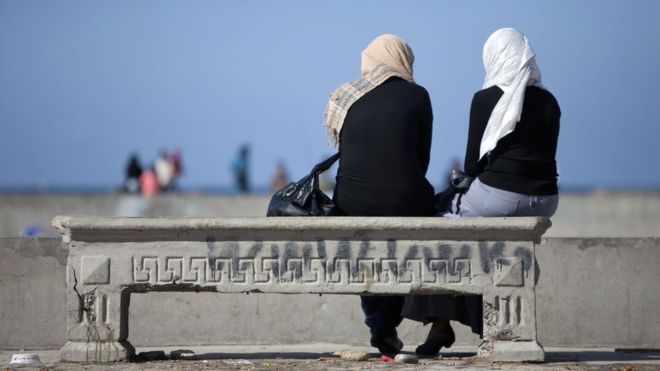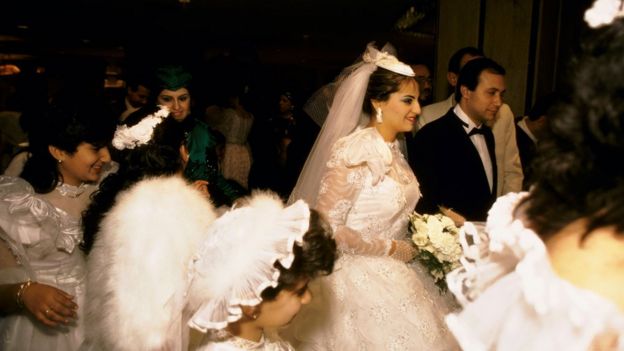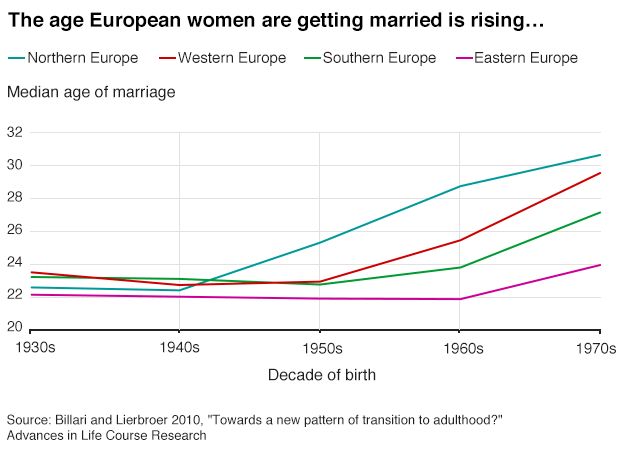
Young people all over the world are struggling to save enough money to move out of their parents' homes, get married and raise families. No longer children, but not yet regarded as adults, they are stuck in a period of "waithood".
"When you get married in Egypt or other places in the region, your house is perfect, it's as good as it's ever going to be," says Diane Singerman. "You have spices in the kitchen, you have glasses, you have furniture, you have a car if you're wealthy - and everything is set up for you."In the 1990s, Singerman, an American political scientist, was researching family politics and networks in Cairo, when she found that many of the people she was studying were burdened with a common almost insurmountable problem: how to pay for marriage.
The costs go beyond simply paying for a big wedding. In order to qualify as worthy husbands, Singerman says, Egyptian grooms and their families need to save up for dower money or jewellery to give the bride. They also need to find a place to live and fill it with the many trappings of married life.
She found that when all of that was accounted for, the cost of marriage averaged 20,194 Egyptian pounds ($6,000 in 1999). That was equivalent to two-and-a-half times the total annual expenditure of an average Egyptian family.
Once you factor in the very high levels of youth unemployment, marriage becomes a nearly impossible goal. Singerman found that on average poorer male workers and their fathers had to save all their earnings for more than seven years to make it happen.
"This huge financial problem just kind of popped out and it was very central to lots of other issues as well," she says.
There is, for a start, the psychological impact on young people. Since pre-marital sex remains taboo, it is a lonely decade for many of these would-be grooms and brides.
But the real significance of delayed marriage goes beyond financial and romantic factors. "In Egypt young people live with their families until they get married, and frankly they are not considered adults until they get married, especially for women," says Singerman.
But since they definitely aren't children either, she coined a new term to describe the long period of limbo that preceded marriage - "waithood".

They have applied the term "waithood" to groups or men and women around the world, though plenty of less flattering terms are in common use too.
"Bamboccioni" (big dummy boys) - describes Italian men in their 20s and 30s who still live with their parents, much like the "yo-yo generation" of young people in the UK that move back home after university. In West Africa, "youthmen" are young men who haven't yet attained adulthood in society's eyes. Meanwhile, "freeters" in Japan and "slackers" in the US describe a legion of young people unable or unwilling to get a "proper" job.
While officialdom everywhere chooses an age - 18, perhaps, or 21 - to label someone an adult, cultures have their own ways of judging whether someone is mature - and different countries place the emphasis on different life stages.
Financial security is key to all of the above. High rates of youth unemployment are the result of the sheer number of young people, the economic crisis that began in 2008, and, some academics argue, the restructuring of economies in the developing world.
Workless generation
Workers under 24 s
- Greece 58%
- Spain 57%
- Egypt 39%
- Italy 39%
- UK 20%
Having carried out research in Mozambique, South Africa, Senegal and Tunisia, anthropologist Alcinda Honwana argues that most young people in Africa are stuck in waithood. But she dislikes the aura of passivity that goes with the term.
"What I realized is that although waithood was very debilitating for young people, it is also a phase of extreme creativity," she says, "because life goes on and young people find ways to cope with it."
She cites young people's willingness to find work in the informal economy, to migrate, and to affiliate themselves to revolutionary or radical causes as responses to a situation that has been imposed on them by failed economic policies and corrupt governments.
Many of the activists that took part in the 2011 string of protests that came to be known as the Arab Spring were young, educated but socially excluded, with plenty of spare time on their hands. The past decade has seen a rise in the number of protests in which young people feature prominently, from Mozambique to Greece, to the UK.

Singerman believes that migration, so much in the news at the moment, is in large part about accumulating money for marriage. She suggests that the difficulty of getting married may be a factor in the growth of the so-called Islamic State. As part of a package designed to entice young men to fight for the group in Iraq and Syria they are promised wives. The systematic rape of women and girls in the conflict has also been well-reported.
"They're using very ancient understandings of war and women as booty of war, basically, to be distributed to one's soldiers," says Singerman. "In a sense they're attracting men because they're able to offer them wives, or women. Or so they say."
But there are some socially progressive consequences of waithood as well. "We see that there are more and more young women remaining at school, finishing their degrees and also becoming more and more independent and not relying on marriage."

"Economics is important, but culture plays a crucial role too," says Steven Mintz, a historian at the University of Texas at Austin. "In the past, people aspired to be older. The dominant culture was an adult culture, which was associated with sophistication, worldliness and experience. Today, that has been inverted. Youth culture is the ideal - most people aspire to be younger, not older, and it is youth culture that is seen as more thrilling than anything that adulthood has to offer.
"No-one says 'Life begins at 40' any more, at least not without irony."

No comments:
Post a Comment
Through this ever open gate
None come too early
None too late
Thanks for dropping in ... the PICs